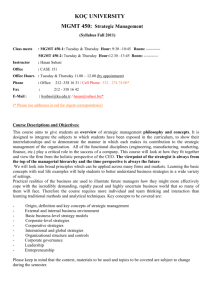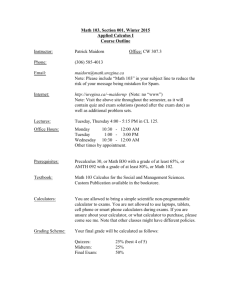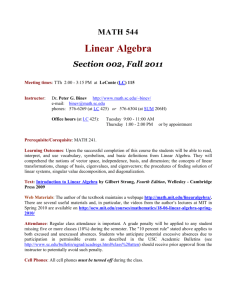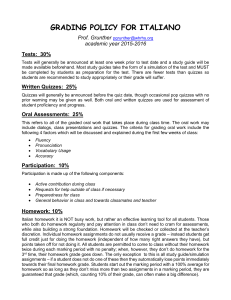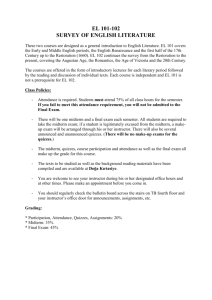koç university mgmt 450-1
advertisement
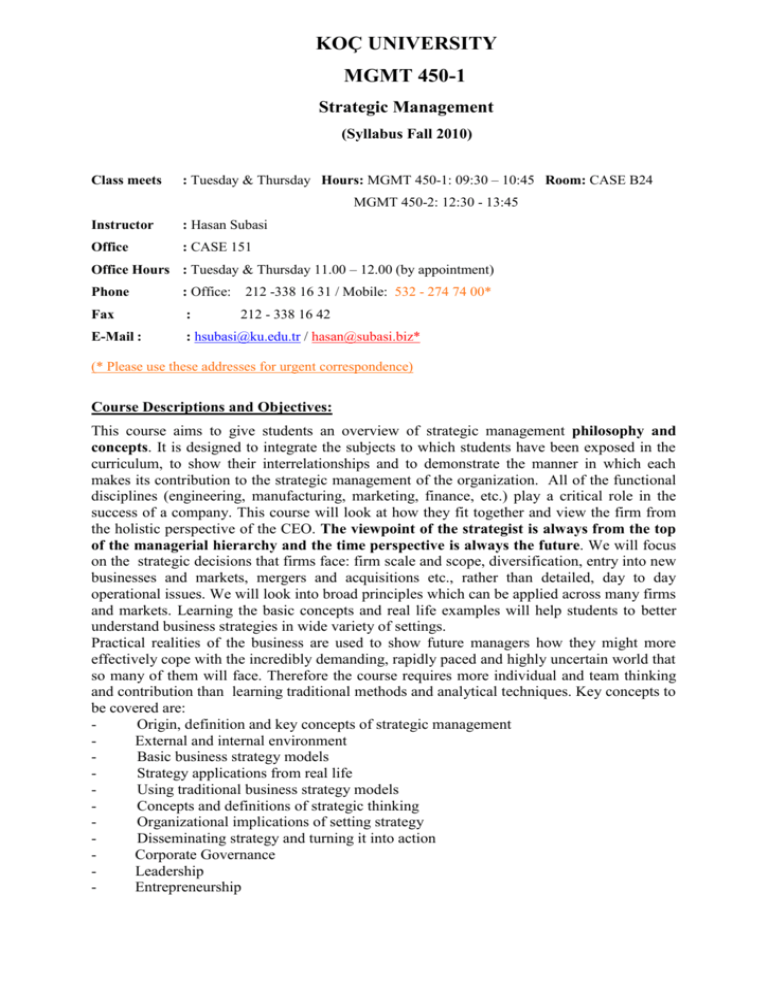
KOÇ UNIVERSITY MGMT 450-1 Strategic Management (Syllabus Fall 2010) Class meets : Tuesday & Thursday Hours: MGMT 450-1: 09:30 – 10:45 Room: CASE B24 MGMT 450-2: 12:30 - 13:45 Instructor : Hasan Subasi Office : CASE 151 Office Hours : Tuesday & Thursday 11.00 – 12.00 (by appointment) Phone : Office: 212 -338 16 31 / Mobile: 532 - 274 74 00* Fax : E-Mail : : hsubasi@ku.edu.tr / hasan@subasi.biz* 212 - 338 16 42 (* Please use these addresses for urgent correspondence) Course Descriptions and Objectives: This course aims to give students an overview of strategic management philosophy and concepts. It is designed to integrate the subjects to which students have been exposed in the curriculum, to show their interrelationships and to demonstrate the manner in which each makes its contribution to the strategic management of the organization. All of the functional disciplines (engineering, manufacturing, marketing, finance, etc.) play a critical role in the success of a company. This course will look at how they fit together and view the firm from the holistic perspective of the CEO. The viewpoint of the strategist is always from the top of the managerial hierarchy and the time perspective is always the future. We will focus on the strategic decisions that firms face: firm scale and scope, diversification, entry into new businesses and markets, mergers and acquisitions etc., rather than detailed, day to day operational issues. We will look into broad principles which can be applied across many firms and markets. Learning the basic concepts and real life examples will help students to better understand business strategies in wide variety of settings. Practical realities of the business are used to show future managers how they might more effectively cope with the incredibly demanding, rapidly paced and highly uncertain world that so many of them will face. Therefore the course requires more individual and team thinking and contribution than learning traditional methods and analytical techniques. Key concepts to be covered are: Origin, definition and key concepts of strategic management External and internal environment Basic business strategy models Strategy applications from real life Using traditional business strategy models Concepts and definitions of strategic thinking Organizational implications of setting strategy Disseminating strategy and turning it into action Corporate Governance Leadership Entrepreneurship Please keep in mind that the context, materials to be used and topics to be covered are subject to change during the semester. Course materials: Text book: THE MANAGEMENT OF STRATEGY: CONCEPTS and CASES (9th Edition) Michael A. Hitt, R. Duane Ireland and Robert E. Hoskisson. Southwestern College Publishing Grading: Grading is intended to reflect variety of performance measures including spoken communication, simple research and idea formation, individual and teamwork, written quizzes and exams. Contribution (Participation, attendance, preparation) Quizzes Midterm Term Project Final Exam 15 % 25 % 20 % 15 % 25 % a) Contribution: Attendance, Participation (15 %) Your participation grade will be based on several components. You are not expected to read and memorize all the content to get high grades. Active listening and taking notes in the classroom are highly recommended. There are no “absolute” rights and wrongs in competitive business strategy. Therefore students need to be involved fully to understand the concepts and express themselves in their own way. Participation in class discussions Learning is a two way process. I strongly believe that real understanding occurs when you communicate your ideas. Your ability to express yourself, courage to share your ideas with me and the rest of the class, willingness to participate in a discussion and being able to do all this “loud” is an extremely important competency for a successful manager. Based on my business experience, I will highly value disagreement and debate, while “respectful silence” gets no credit. Attendance Based on the above, you can not learn and contribute if you miss classes. Students are expected to attend all the classes and take all the quizzes. Each one of you has a role in the learning process with your unique thoughts, delivery of assignments and presentations. Your absence will have a negative impact on the whole class. b) Quizzes (25 %) I will give you five or six unannounced, short (15 minutes) and simple quizzes to identify and reward students who are regular and well prepared. You don’t need to study for these quizzes beyond what is necessary for class and case discussions. There will be no make-ups for the quizzes. Your final quiz grade will be the average of your four highest quiz grades. c) Term project / team work (15 %) Students will form teams to work together for the Term Project. By the end of the course, each team will make a presentation of their Term Project assignment, applying what we have covered in the course to the presentation. Presentation skills are very important in professional life and each student will contribute to presentation of the Project. I expect to see competition between the teams and evaluation of the rest of the class members will be a factor in grading of the Term Project. d) Exams (45 %) There will be one Midterm (20%) and one Final Exam (25%). Midterm will cover the first nine chapters of the Text Book plus reading material. The Final Exam will cover material (book and reading material) from the entire course. Academic integrity: Honesty, ethical behavior and trust are important to all of us as individuals in life. You are expected to adhere to the principles of academic honesty at Koç University.
